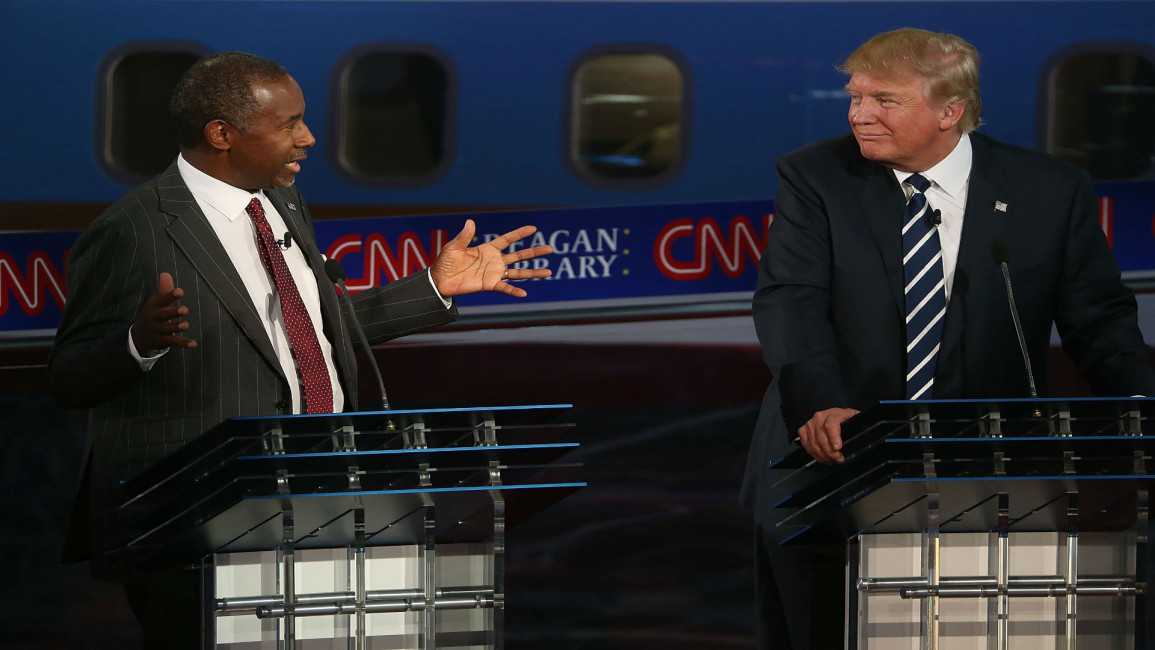
Republican frontrunners show their ignorance
These have been the themes of Republican discourse on the Middle East during the campaign to secure the nomination to be the GOP's candidate for president in 2016. Two candidates straight out of leftfield are currently surging ahead of their 13 rivals, and their foreign policy views have been raising plenty of eyebrows.
Donald Trump is the current front-runner to challenge the Democrats next year. The celebrity business tycoon is not a career politician and has no experience in international political affairs. His campaign website makes no mention of his foreign policy stances, but they aren't difficult to find thanks to his command of the headlines.
On the situation in Syria, Trump is critical of President Barack Obama's administration for arming rebel groups, while "they have absolutely no idea who they are".
Trump describes Iraq as "a disaster right now", claiming "it's gonna be taken over by Iran and ISIS" and wants to see increased military intervention against the Islamic State group.
He opposes the nuclear deal and rapprochement with Iran - a "bad deal" that he warns will lead to Iran obtaining nuclear weapons and taking over parts of the planet.
Trump was ridiculed when he admitted to not knowing the difference between Hamas and Hizbollah, or between the Kurds and the Quds force, and wasn't embarrassed to admit that he takes his foreign policy advice from TV news shows.
| Trump responded by saying that, as president, he would apply his successful business strategies to international relations |
Criticised for his lack of foreign policy nous and specific military strategies, Trump responded by saying that, as president, he would apply his successful business strategies, in particular his ability to close a deal, to international relations.
Economics is at the heart of Trump's foreign policy thinking.
To tackle IS, he advocates seizing Iraqi and Syrian oil fields to reduce the group's income. This focus on oil was also evident in his 2011 book Time to Get Tough, in which he stated that the United States should be gifted Iraq's oil reserves as a thank you from the Iraqi people for overthrowing Saddam Hussein.
He also expects Saudi Arabia to start paying huge sums of money to the US, on the grounds that the kingdom owes its very existence to America's patronage.
Like all Republican candidates, Trump professes loyalty to Israel, and even made an endorsement video for Binyamin Netanyahu in 2013. His understanding of Israel has also been called in to question, notably in relation to a 2011 statement, when he quoted a phantom statistic that 99 percent of Egyptians wanted their country to abandon the peace treaty with Israel.
But if Trump has come in for ridicule on foreign affairs, he need not panic yet. His closest challenger is Ben Carson, a Detroit doctor-turned-political commentator, who has also been exposed for a lack of knowledge on crucial international issues.
The three foreign policy issues Carson has focused on in his campaign have been Russia ("continuing to fuel destabilisation in the Middle East",) keeping Gitmo open, and the need to support Israel ("our bulwark ally in the Middle East").
| Trump's closest challenger is Ben Carson, who has also been exposed for a lack of knowledge on crucial international issues |
All standard Republican fare, but Carson is different, in that he opposed the invasions of Afghanistan and Iraq, although he does support regime change by economic means and supported the extra-judicial killing of Osama bin Laden.
On the creation of a Palestinian state, Carson caused a stir when he posed the question: "Can you sort of slip that area down into Egypt?"
He pointed out that Egypt has much more space available than the Jewish state.
But he has not consistently kowtowed to the Zionist lobby, and in another controversial statement claimed that the Nazi holocaust would have been "greatly diminished" had Jews been in possession of personal firearms.
Perhaps this is a sign that even the Zionist lobby cannot match the influence of the gun lobby in Washington.
On IS, Carson has called for the use of "men on the ground", covert tactics, special operations forces, support for regional allies as well as economic tactics.
Specifically, Carson thinks that IS should be pushed out of Iraq and in to Syria. Why? "That'll make them look like losers. So it'll make it much more difficult to recruit people when they look like losers."
Despite their foreign policy naivety, it looks like only one of Trump or Carson will emerge as a loser in the race to secure the Republican nomination.
Tom Charles is a London-based writer, editor and literary agent. He previously worked in the UK parliament, including as a lobbyist for Palestinian rights. He has contributed to Jadaliyya and the Journal of Palestinian Refugee Studies.
Opinions expressed in this article remain those of the author and do not necessarily represent those of al-Araby al-Jadeed, its editorial board or staff.




